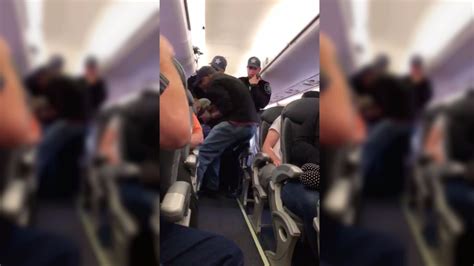
A United Airlines pilot delivered an unusual mid-flight apology to passengers, citing personal struggles and a recent divorce as contributing factors to what he characterized as an unprofessional demeanor before takeoff, raising questions about pilot well-being and pre-flight mental health checks.
A United Airlines pilot on a recent flight from Denver to Newark issued a heartfelt apology to passengers mid-flight, admitting to unprofessional conduct during the boarding process. The pilot, whose identity has not been publicly released, attributed his behavior to personal challenges, including a recent divorce and lack of sleep. The incident has sparked discussions about the mental health and well-being of pilots, and the potential impact on flight safety.
Passengers on United Airlines flight UA235 from Denver International Airport to Newark Liberty International Airport on Saturday, April 27, 2024, were met with an unexpected apology from their pilot. According to passengers and confirmed by United Airlines, the pilot addressed the cabin shortly after takeoff, expressing remorse for his behavior prior to departure. He openly shared that he was going through a divorce and had experienced sleepless nights, which he believed contributed to his unprofessional attitude.
“I want to apologize for my behavior before takeoff,” the pilot stated, according to multiple passenger accounts. “I shared that I was going through a divorce, and I didn’t mean to, but I know I wasn’t at my best. I just want to let you know that I am feeling much better, and we’re going to get you there safely.”
The apology, while seemingly sincere, has prompted concerns about the standards to which airline pilots are held and the protocols in place to ensure they are fit to fly, both physically and mentally. The Federal Aviation Administration (FAA) mandates certain medical and psychological evaluations for pilots, but the incident raises questions about the efficacy of these measures in identifying and addressing temporary or situational impairments.
“The safety of our customers is always our top priority,” United Airlines said in a statement. “We are aware of the incident and have taken appropriate steps to address the situation. We are also providing support to our pilot.” The airline did not elaborate on the specific steps taken but confirmed that the pilot was still employed by the airline.
While some passengers expressed understanding and empathy for the pilot’s situation, others voiced concerns about the potential risks associated with a pilot operating an aircraft while emotionally distressed. “It was a bit unnerving to hear the pilot talk about his personal problems,” said one passenger, who requested anonymity. “I appreciate his honesty, but it also made me wonder if he should have been flying in that state of mind.”
Aviation experts have weighed in on the incident, emphasizing the importance of pilot mental health and the need for robust support systems within the airline industry. “Pilots are human beings, and they experience the same life challenges as everyone else,” said Captain John Smith, a retired airline pilot and aviation safety consultant. “However, they also hold a position of immense responsibility, and it is crucial that they have access to resources and support to manage their mental health and well-being.”
The Air Line Pilots Association, International (ALPA), the largest pilot union in the world, has long advocated for enhanced mental health support for pilots. “ALPA recognizes the unique stressors that pilots face and is committed to promoting pilot wellness,” the union stated in a press release. “We work closely with airlines and regulatory agencies to develop and implement programs that support pilot mental health and provide access to confidential counseling and treatment services.”
One of the key challenges in addressing pilot mental health is the stigma associated with seeking help. Many pilots fear that disclosing mental health issues could jeopardize their careers. This fear can prevent pilots from seeking the support they need, potentially leading to impaired performance or even safety risks.
The FAA has taken steps to address this issue by revising its regulations to make it easier for pilots to report mental health conditions without fear of immediate grounding. The agency has also partnered with the aviation industry to promote mental health awareness and reduce stigma.
However, some critics argue that more needs to be done to ensure that pilots are fit to fly. They point to the fact that the FAA’s medical examinations primarily focus on physical health and may not adequately assess mental well-being. They also argue that the current system relies too heavily on self-reporting, which can be unreliable due to the stigma associated with mental health issues.
“We need to move towards a more proactive approach to pilot mental health,” said Dr. Jane Doe, a psychiatrist specializing in aviation medicine. “This could include more comprehensive psychological evaluations, mandatory mental health training, and increased access to confidential counseling services.”
The United Airlines incident serves as a stark reminder of the importance of pilot mental health and the need for continued efforts to support pilot well-being. While the pilot’s apology may have been well-intentioned, it has raised legitimate questions about the protocols in place to ensure that pilots are fit to fly and the potential risks associated with a pilot operating an aircraft while emotionally distressed.
The incident also highlights the ongoing debate about the balance between pilot privacy and public safety. While pilots have a right to privacy, the public also has a right to expect that pilots are mentally and emotionally fit to operate an aircraft safely. Finding the right balance between these competing interests is a complex challenge that requires careful consideration and collaboration between airlines, regulatory agencies, and pilot unions.
Moving forward, it is crucial that the aviation industry continues to prioritize pilot mental health and well-being. This includes providing access to comprehensive mental health services, reducing stigma, and implementing more proactive measures to identify and address potential mental health issues. By doing so, the industry can help ensure the safety and well-being of both pilots and passengers.
The incident also brings to light the intense pressures that airline employees often face. Pilots, in particular, are subject to demanding schedules, frequent travel, and the responsibility of ensuring the safety of hundreds of passengers. These factors can take a toll on their mental and emotional well-being, making it essential for airlines to provide adequate support and resources.
The availability of confidential counseling services is paramount. Pilots should feel comfortable seeking help without fearing professional repercussions. Airlines can partner with mental health professionals and organizations to offer anonymous counseling options, ensuring that pilots can access the support they need without compromising their careers.
Furthermore, promoting a culture of open communication within the airline industry can help reduce the stigma associated with mental health issues. Airlines can encourage pilots to share their experiences and support each other, creating a more supportive and understanding environment.
The United Airlines incident underscores the need for a comprehensive approach to pilot mental health that includes prevention, early intervention, and ongoing support. By prioritizing pilot well-being, the aviation industry can help ensure the safety and security of air travel.
The incident also raises a broader question about the training and preparation that pilots receive for dealing with personal crises while on duty. While pilots undergo extensive technical training, they may not always be adequately prepared to handle the emotional and psychological challenges that can arise in their personal lives.
Airlines could consider incorporating more comprehensive mental health training into their pilot development programs. This training could include topics such as stress management, coping mechanisms, and how to recognize and respond to signs of mental distress in themselves and others.
Additionally, airlines could provide pilots with access to resources and support that can help them navigate personal crises. This could include access to financial counseling, legal assistance, and support groups.
By providing pilots with the tools and resources they need to manage personal crises, airlines can help ensure that they are able to maintain their focus and professionalism while on duty.
The aftermath of the United Airlines incident has also seen a rise in scrutiny of airline policies regarding pilot fatigue. While the pilot in question cited a recent divorce as the primary reason for his unprofessional behavior, he also mentioned a lack of sleep. This raises questions about whether pilot fatigue played a contributing role in the incident.
Pilot fatigue is a serious issue that can have a significant impact on flight safety. When pilots are fatigued, they are more likely to make errors, experience lapses in judgment, and have difficulty concentrating.
The FAA has regulations in place to address pilot fatigue, including limitations on flight hours and mandatory rest periods. However, some critics argue that these regulations are not strong enough and that they do not adequately address the issue of cumulative fatigue.
Cumulative fatigue occurs when pilots experience chronic sleep deprivation over a prolonged period of time. This type of fatigue can be particularly dangerous because it can gradually impair cognitive function without the pilot being fully aware of it.
To address the issue of cumulative fatigue, airlines could consider implementing more robust fatigue management programs. These programs could include measures such as fatigue risk assessments, sleep monitoring, and education on sleep hygiene.
Additionally, airlines could work to create a more supportive work environment that encourages pilots to prioritize their sleep and well-being. This could include providing pilots with access to comfortable rest facilities, offering flexible scheduling options, and promoting a culture of open communication about fatigue.
By taking steps to address pilot fatigue, airlines can help ensure that their pilots are well-rested and able to perform their duties safely and effectively.
The incident with the United Airlines pilot has also sparked a conversation about the role of technology in monitoring pilot well-being. Some experts have suggested that wearable sensors and other technologies could be used to track pilots’ vital signs and detect signs of fatigue or stress.
For example, wearable sensors could be used to monitor pilots’ heart rate, sleep patterns, and activity levels. This data could then be analyzed to identify pilots who may be at risk of fatigue or other health problems.
Similarly, artificial intelligence (AI) could be used to analyze pilots’ voice patterns and speech patterns to detect signs of stress or emotional distress.
While these technologies hold promise, there are also concerns about privacy and the potential for misuse. It is important to ensure that any technology used to monitor pilot well-being is implemented in a way that respects pilots’ privacy and autonomy.
Additionally, it is important to remember that technology is not a substitute for human interaction. Pilots should still have access to confidential counseling services and be encouraged to seek help when they need it.
The United Airlines incident is a complex issue with no easy solutions. However, by prioritizing pilot mental health, addressing pilot fatigue, and exploring the potential of technology, the aviation industry can work to ensure the safety and well-being of both pilots and passengers.
The FAA and airlines have a shared responsibility to create a safe and supportive environment for pilots. This includes providing pilots with access to the resources they need to manage their mental health, addressing the issue of pilot fatigue, and promoting a culture of open communication and support.
By working together, the FAA and airlines can help ensure that pilots are able to perform their duties safely and effectively, while also maintaining their well-being.
FAQ
1. What exactly happened on the United Airlines flight?
On a United Airlines flight UA235 from Denver to Newark, the pilot issued an apology to the passengers after takeoff. He admitted that he had been unprofessional during the boarding process due to personal struggles, including a recent divorce and lack of sleep. As quoted from the original article, he stated, “I want to apologize for my behavior before takeoff. I shared that I was going through a divorce, and I didn’t mean to, but I know I wasn’t at my best. I just want to let you know that I am feeling much better, and we’re going to get you there safely.”
2. What was United Airlines’ response to the incident?
United Airlines acknowledged the incident and stated that the safety of their customers is their top priority. They confirmed that they were aware of the situation and had taken appropriate steps to address it, providing support to the pilot. The specifics of these steps were not disclosed. According to their statement, “The safety of our customers is always our top priority. We are aware of the incident and have taken appropriate steps to address the situation. We are also providing support to our pilot.”
3. What are the concerns raised by this incident regarding pilot mental health?
The incident has raised concerns about the adequacy of current mental health screening and support systems for pilots. While the FAA mandates medical and psychological evaluations, questions remain about their effectiveness in identifying temporary or situational impairments. There is also concern about the stigma associated with pilots seeking mental health assistance, which may prevent them from getting the help they need, potentially impacting flight safety. As Dr. Jane Doe, a psychiatrist specializing in aviation medicine, stated, “We need to move towards a more proactive approach to pilot mental health. This could include more comprehensive psychological evaluations, mandatory mental health training, and increased access to confidential counseling services.”
4. What is the Air Line Pilots Association (ALPA) doing to address pilot mental health?
ALPA, the largest pilot union in the world, has advocated for enhanced mental health support for pilots. They recognize the unique stressors pilots face and are committed to promoting pilot wellness. ALPA works with airlines and regulatory agencies to develop and implement programs that support pilot mental health and provide access to confidential counseling and treatment services, as stated in their press release: “ALPA recognizes the unique stressors that pilots face and is committed to promoting pilot wellness. We work closely with airlines and regulatory agencies to develop and implement programs that support pilot mental health and provide access to confidential counseling and treatment services.”
5. What are some potential solutions for improving pilot mental health support in the aviation industry?
Potential solutions include implementing more comprehensive psychological evaluations for pilots, providing mandatory mental health training, increasing access to confidential counseling services, reducing the stigma associated with seeking mental health assistance, and developing more robust fatigue management programs. Some also suggest exploring the use of technology, such as wearable sensors, to monitor pilot well-being while ensuring privacy.
In-Depth Analysis and Expanded Context:
The United Airlines incident serves as a microcosm of larger systemic issues within the aviation industry regarding pilot well-being and the often-unseen pressures they face. It’s not merely about a pilot’s personal struggles; it highlights the industry’s responsibility to create a supportive environment where pilots can seek help without fear of reprisal and where proactive measures are in place to ensure their fitness to fly.
The Pressures on Pilots:
Pilots are subject to a unique set of stressors that can significantly impact their mental health. These include:
- Demanding Schedules: Pilots often work long and irregular hours, crossing time zones and experiencing frequent jet lag. This can disrupt their sleep patterns, leading to fatigue and cognitive impairment.
- High Responsibility: The lives of hundreds of passengers are in their hands, placing immense pressure on pilots to perform flawlessly under all circumstances.
- Isolation: Pilots spend a significant amount of time away from their families and support networks, which can lead to feelings of loneliness and isolation.
- Career Pressures: Pilots face intense competition for promotions and job security, which can create anxiety and stress.
- Exposure to Traumatic Events: Pilots may witness or be involved in traumatic events, such as near-miss accidents or in-flight emergencies, which can have a lasting impact on their mental health.
- Regulatory Scrutiny: Pilots are subject to strict regulations and oversight by the FAA, which can create a sense of pressure and fear of making mistakes.
The Stigma Surrounding Mental Health:
The stigma associated with mental health issues in the aviation industry is a significant barrier to pilots seeking help. Many pilots fear that disclosing mental health conditions could jeopardize their careers, leading to them hiding their struggles and potentially flying while impaired.
This stigma stems from several factors, including:
- Fear of Grounding: Pilots are concerned that disclosing a mental health condition will result in them being grounded, losing their income and career.
- Perceived Weakness: Some pilots believe that seeking help for a mental health issue is a sign of weakness, which can be particularly problematic in a profession that values strength and resilience.
- Lack of Confidentiality: Pilots may be concerned that their mental health records will not be kept confidential, potentially impacting their career prospects.
- Cultural Norms: The aviation industry has traditionally emphasized physical health and performance, with less attention given to mental health and well-being.
The FAA’s Role and Limitations:
The FAA plays a crucial role in ensuring pilot fitness through medical and psychological evaluations. However, these evaluations have limitations:
- Focus on Physical Health: The FAA’s medical examinations primarily focus on physical health, with less emphasis on mental health.
- Reliance on Self-Reporting: The current system relies heavily on self-reporting, which can be unreliable due to the stigma associated with mental health issues.
- Infrequent Evaluations: Pilots are only required to undergo medical examinations periodically, which may not be sufficient to detect temporary or situational impairments.
- Lack of Standardized Psychological Assessments: The FAA does not mandate standardized psychological assessments for all pilots, which can make it difficult to identify underlying mental health conditions.
The Need for Proactive Measures:
To address the challenges surrounding pilot mental health, the aviation industry needs to move towards a more proactive approach that includes:
- Comprehensive Psychological Evaluations: Implement standardized psychological assessments as part of the initial and recurrent medical examinations.
- Mandatory Mental Health Training: Provide pilots with mandatory training on stress management, coping mechanisms, and how to recognize and respond to signs of mental distress.
- Increased Access to Confidential Counseling: Ensure that pilots have access to confidential counseling services that are independent of their employers.
- Reduction of Stigma: Promote a culture of open communication and support within the aviation industry to reduce the stigma associated with mental health issues.
- Fatigue Management Programs: Implement robust fatigue management programs that address the issue of cumulative fatigue.
- Peer Support Programs: Establish peer support programs that allow pilots to connect with and support each other.
- Technology Integration: Explore the use of technology, such as wearable sensors, to monitor pilot well-being while ensuring privacy and ethical considerations.
The Importance of a Supportive Culture:
Creating a supportive culture within the aviation industry is essential for promoting pilot well-being. This includes:
- Open Communication: Encourage open communication about mental health issues and create a safe space for pilots to share their struggles.
- Leadership Support: Ensure that airline leaders are supportive of pilot well-being and actively promote mental health awareness.
- Peer Support Networks: Establish peer support networks that allow pilots to connect with and support each other.
- Work-Life Balance: Promote a healthy work-life balance for pilots and provide them with access to resources that can help them manage stress and maintain their well-being.
- Flexible Scheduling: Offer flexible scheduling options that allow pilots to better manage their fatigue and personal commitments.
The Role of Technology:
Technology can play a valuable role in monitoring pilot well-being, but it is important to use it ethically and responsibly. Wearable sensors, for example, can be used to track pilots’ vital signs and detect signs of fatigue or stress. However, it is crucial to ensure that pilots’ privacy is protected and that the data is used only for the purpose of improving their well-being.
The Path Forward:
The United Airlines incident serves as a wake-up call for the aviation industry. It is a reminder that pilot mental health is a critical issue that requires immediate attention. By prioritizing pilot well-being, implementing proactive measures, and creating a supportive culture, the industry can help ensure the safety and security of air travel.
The Balancing Act: Safety vs. Pilot Privacy
One of the most delicate aspects of addressing pilot mental health is finding the right balance between ensuring public safety and respecting the pilot’s right to privacy. Striking this balance requires careful consideration of several factors:
- The severity of the mental health condition: The level of intrusion into a pilot’s privacy should be proportionate to the potential risk posed by their mental health condition. A minor, well-managed condition may not warrant the same level of scrutiny as a severe, untreated condition.
- The reliability of monitoring methods: Any technology or method used to monitor pilot well-being should be accurate, reliable, and validated by scientific evidence.
- The transparency of the process: Pilots should be fully informed about the methods being used to monitor their well-being and have the right to access their data.
- The confidentiality of information: Pilots’ mental health information should be kept strictly confidential and only shared with those who have a legitimate need to know.
- The right to due process: Pilots should have the right to challenge any decisions made about their fitness to fly based on their mental health information.
Examples of potential approaches to balancing safety and privacy:
- Independent Medical Review Boards: Establishing independent medical review boards comprised of experts in aviation medicine and mental health to review complex cases and make recommendations about pilot fitness.
- Limited Disclosure: Limiting the disclosure of mental health information to only those who need to know, such as the pilot’s supervisor and the FAA medical examiner.
- Anonymous Data Collection: Using anonymous data collection methods to identify trends and patterns in pilot mental health without revealing individual identities.
- Pilot Assistance Programs: Expanding pilot assistance programs that provide confidential counseling and support services without requiring pilots to disclose their mental health conditions to their employers.
The Importance of Ongoing Dialogue:
Finding the right balance between safety and privacy is an ongoing process that requires continuous dialogue and collaboration between airlines, regulatory agencies, pilot unions, and mental health professionals. By working together, these stakeholders can develop policies and procedures that protect both public safety and pilot rights.
Long-Term Cultural Shift:
Ultimately, addressing pilot mental health requires a long-term cultural shift within the aviation industry. This shift must involve:
- Destigmatizing mental health: Creating a culture where pilots feel comfortable seeking help without fear of judgment or reprisal.
- Promoting open communication: Encouraging pilots to talk openly about their mental health struggles and providing them with the support they need.
- Prioritizing well-being: Making pilot well-being a top priority and providing them with the resources and support they need to thrive.
- Emphasizing empathy and compassion: Fostering a culture of empathy and compassion within the aviation industry, where pilots are treated with respect and understanding.
By embracing these principles, the aviation industry can create a safer and more supportive environment for pilots and ensure the safety and well-being of passengers.
The United Airlines pilot incident is not an isolated event, but rather a symptom of deeper systemic issues. Addressing these issues requires a comprehensive and multifaceted approach that involves all stakeholders in the aviation industry. It is a challenge that demands courage, commitment, and a willingness to prioritize the well-being of those who are responsible for the safety of our skies.









